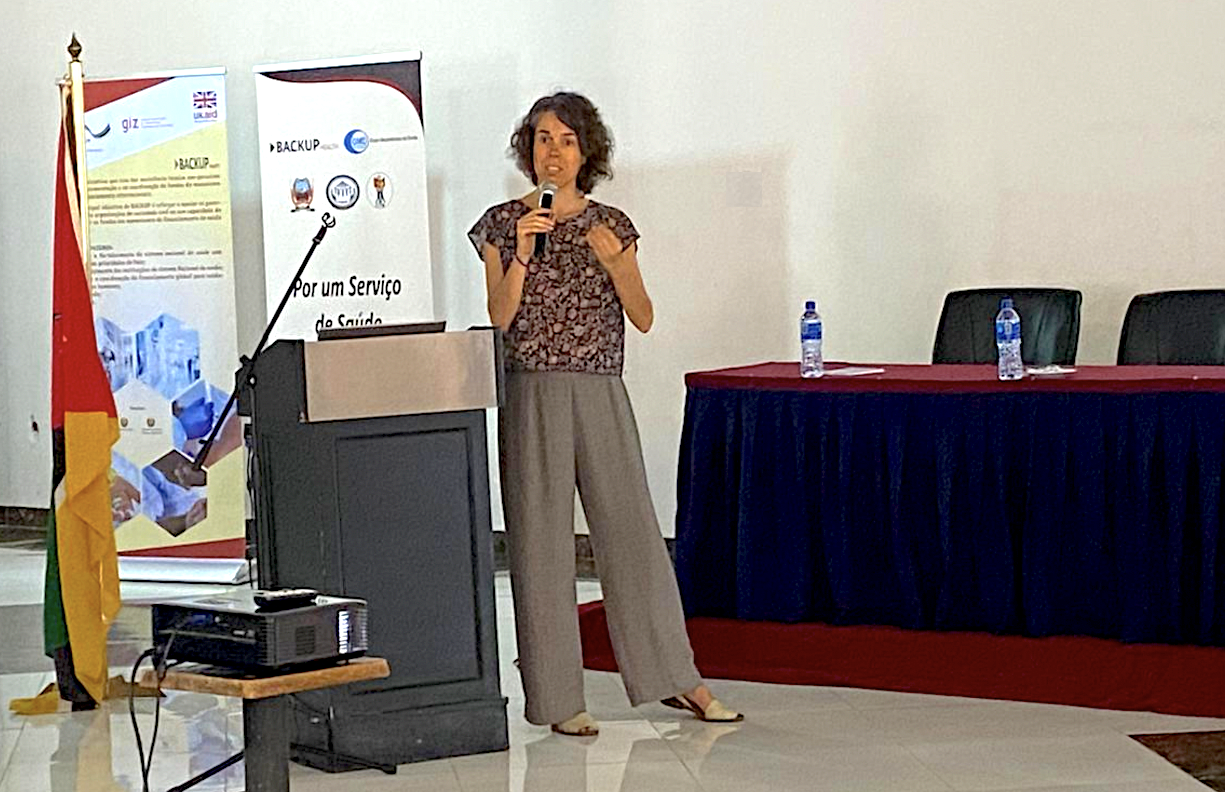The five-year appointment of a P4H country focal person as health financing adviser to the Ministry of Health of Mozambique yielded multiple contributions. Complex relationships were deepened, and common cause was forged across sectors around shared interests and technical challenges in policy-making about health financing. The successes owe in part to the steady tenure of the P4H country focal person.
The Ministry of Health of Mozambique (MISAU), Deutsche Gesellschaft für Internationale Zusammenarbeit (GIZ) and the Swiss Agency for Development and Cooperation (SDC) came together to deploy adviser Cristina Manzanares as P4H country focal person (P4H-CFP) to MISAU. GIZ contracted Cristina in this role, and SDC funded her position. The objective for Cristina as P4H-CFP was to support policy-making efforts in health financing to advance universal health coverage (UHC) and promote alignment among stakeholders. Cristina succeeded a prior P4H-CFP and held the position from November 2017 to June 2023.
Key challenges of the Mozambican health system include low quality, gaps in coverage, increasing user fees, and the high costs and growth of noncommunicable diseases. Mozambique’s estimated UHC service coverage index in 2021, which is 44, compares favorably to peer countries with similar income and spending levels.
Response to a challenging environment
In the context of Mozambique’s challenges, the P4H-CFP worked to advise MISAU in the assessment of the economic, social and political implications of health financing policy reforms, in UHC policy, including financial protection, and specifically in health financing policy. During her tenure, Cristina worked to inform the health financing policy process in the following ways:
- Integrating international evidence and recommendations in health financing policy deliberations
- Applying situational and comparative analysis in UHC indicators (service coverage and financial protection) and expenditure
- Using household budget survey data to inform analyses
- Supporting domestic resource mobilization: prioritizing the state budget allocation to health, assessing the macroeconomic and fiscal context for social spending (and linkage with the Ministry of Economy and Finance of Mozambique (MEF)), exploring taxation for health
- Studying the feasibility and impacts of reforms in health financing mechanisms including social health insurance and community-based health insurance
- Analyzing benefit package design including user fees (types, level, impact, reporting, reform proposals)
- Contributing health economics know-how to the costing of health services
- Assessing options to produce efficiency estimates
This analytical work provided a training ground for technical staff throughout the collaborative process. The results provided input into technical and decision-making meetings on health financing policy. A key achievement is the joint preparation of the Health Financing Strategy 2022-30.
Coordination in health financing
Policy-making requires fostering relationships among and between internal and external stakeholders and keen understanding of their different views and power levels. The P4H-CFP promoted internal coordination between the planning and health economics department of Mozambique and other national directorates and departments (such as of finance, to advance the agenda on public financial management, and of public health, to articulate MISAU’s position on health taxes).
Crucially, this position opened up collaboration between MISAU and the MEF, especially on allocations, on domestic resource mobilization and on public financial management. Jointly with the tax authority, MISAU drafted a proposal on health taxes for the country, based on the country’s epidemiological profile and on evidence.
Support of joint work between MISAU and partners
Collaborative efforts the P4H-CFP supported include the following activities.
- Dialogue sessions to advance HF policy
- The work of the planning, financing and strategic investment group
- Liaison with international organizations on health financing: World Health Organization regarding the Health Financing Progress Matrix; the Global Financing Facility for Women, Children and Adolescents regarding disbursement linked indicators on health financing; Southern African Development Community–African Union’s dialogue on health financing; the Global Fund to Fight AIDS, Tuberculosis and Malaria
The long-term assignment of P4H-CFP Cristina Manzanares in Mozambique shows the relevance and added value of a standing adviser. In a context of evolving epidemiology, rising demands, needs and costs, and a complex landscape of external dependence, Cristina’s presence in Mozambique bolstered her ability to help strengthen capacities where decisions are taken, promote complementarity of technical assistance, and support policy-making.


